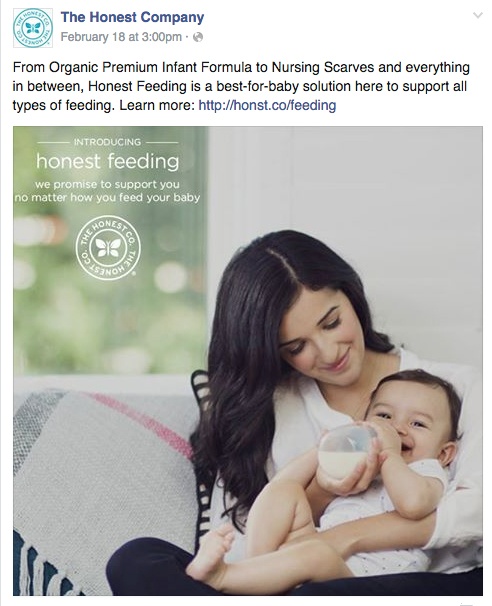A guest blog that I personally believe deserves some attention.
Picture this:
You have an infant. You’ve breastfed before. Some people might call you a lactivist. You like supporting breastfeeding, but you don’t like breastfeeding your own child. Your child wakes up every 90 minutes at night (or less). She was found to have sensitivities to dairy, beans, coconut, all nuts (not just peanuts) and chocolate. Yes, chocolate. You’ve given up those things for 8 months. You sent your daughter to day care so that you could help provide for your family. She was 12 weeks old. You question every day why you aren’t just at home with her. You did it with your first. You feel guilty. You feel torn. It’s not a good feeling. Add to that your pumping schedule – every time you get into a good groove at work, you have to go pump for 20 minutes. When you pump, you don’t get 5 ounces from each breast, you get 2.5 total. From both combined. Your daughter takes 3 ounce bottles. So you pump at night, too. You pump at night even though your daughter wakes up every 1.5 hours to eat. You pump at night because you know it’s the best. 10 to 14 days of every month your progesterone levels rise, because you got your cycle back at 8 weeks post partum. Your pump output goes to 1.5 ounces per session. So you pump more. You’re lucky enough to find a milk donor that is close friends with one of your friends. She sends you enough to make it through your period. You don’t go out on dates with your husband, because the milk it too precious.
One day, you’re pumping and an e-mail comes in. You open that e-mail. It’s the Honest Company. You love the Honest company. You trust their marketing, you trust that they don’t use bad ingredients. You trust their judgment. You’ve been working your ass off – but here it is – “Introducing Honest Feeding. Honest Feeding is a best-for-baby solution.” Honest Company has just launched organic formula.
It hits you for a second. “There’s a solution to this problem. This is a solution. They’re helping me. They’re offering a solution to my awful nights, my tears, my anguish. I can give this to my baby and all of my worries will be over. Because the ingredients aren’t standard formula ingredients, they’re better… So, does it really matter? Is this more equal to breastmilk?”
Then you snap out of it – you realize, “You have done this for 8 months. This is a blip on the radar. You don’t quit on a bad day. You can do this. You have a group of supportive women who encourage you, troubleshoot and a mom that pumps extra just so your child can have breastmilk exclusively.”
What these moms do day in and day out is amazing. Telling them that formula and breastmilk are the same isn’t just wrong – it’s manipulative.
Moms that want to breastfeed receive criticism from all angles. Nursing in public, returning to work, struggling with supply, worrying about weight gain. Some give up. And that’s okay. But what’s not okay is to exploit women who are struggling and might not want to quit by telling them, “We don’t judge you no matter how you choose to feed your baby.”
That was when I knew it. I knew that if I, the woman who battled flat nipples, tongue tie, failure to latch, bad latch, poor pumping output, food sensitivities and all of it… A woman who started a lactation cookie company just so she could help her friends breastfeed. I knew that even though I was part of this group that supported breastfeeding, that if I was questioning it with this marketing – I wasn’t the only one. If this slogan and this marketing made me question it, it would make other moms question it too. Not every mom has the support, research and resources at her disposal to prevent her from giving up when she’s struggling.
I went to Facebook and I found that they were marketing the release there as well. A glance at the comments showed me that numerous women were talking about their “hungry babies” and “maybe I’ll give this a shot” – and I was beside myself.

I don’t ever want to compare the Honest Company to other formula companies. It’s not fair, because they’ve listened to their customers and they’ve always made mistakes right when orders weren’t fulfilled properly. Once a shipment was lost by the shipper and they overnighted my products to me to make up for it. Their customer service and product improvement practices are on point. Their social media marketing is stellar. I meant, STELLAR. And that’s coming from someone who does it for a living. How could this amazing company fall so short in their marketing slogan?
I commented. I got railed. Moms told me that I was dropped on my head. They told me to stop being judgmental. They told me that I was being rude. I posted a breastfeeding support group link on it and I was told I was trolling. They told me shame on me for posting that. They called it gross. They literally attacked.
Shame on me? For posting a Breastfeeding Support Group link? Shame on me for questioning this company’s marketing tactics?
Honest Company made it even better with their responses, invoking the mommy wars and telling us, “It doesn’t matter what you choose.”
But it does matter. Because if you WANT to do it and you want to overcome your struggle with it – there are benefits. They’re scientific and proven. It’s not the same thing. I’m not going to throw out all the research I possibly can here – because it’s available and this is not what this is about. This is about poor marketing.
Here’s their comment to start:
Hi Chrissy and Amber, we appreciate your feedback and will make sure our team hears it. The phrase “Best-for-Baby solution” on this post and on our website is in reference to the entire category of Feeding which includes a range of products intended to support all types of feeding choices and solutions whether it is breastfeeding, combination feeding, or formula. Eight out of the ten products in our Honest Feeding category can be used by a breastfeeding mother.
At the end of the day, when it comes to our littlest eaters, we support all breast feeders, formula feeders, donor milk feeders, combination feeders, tube feeders, mother feeders, father feeders, gay couple feeders, breast cancer fighter feeders, adoptive feeders, grandparent feeders, sibling feeders, every single kind of feeder.
You have to applaud their effort here. It’s a masterful switch of topic. So wait, by questioning their marketing I’m against gay couples, fathers, mothers, tube feeders, combination feeders, formula feeders and donor milk feeders? I must be the bad guy here.
I wasn’t satisfied with the response, and some other moms began to chime in, but most told us to back off. To stop judging. But here’s the thing – we weren’t judging formula. We were judging the marketing.
Further along, someone mentioned the WHO code. In all of my time breastfeeding, I’ve never actually read the WHO code. The code was created by the World Health Organization in response to plummeting breastfeeding rates as a result of formula marketing.
Why did they create it? Here’s their purpose:
- Affirming the right of every child and every pregnant and lactating woman to be adequately nourished, as a means of attaining and maintaining health;
- Recognizing that infant malnutrition is part of the wider problems of lack of education, poverty, and social injustice;
- Recognizing that the health of infants and young children cannot be isolated from the health and nutrition of women, their socioeconomic status and their roles as mothers;
- Conscious that breast-feeding is an unequalled way of providing ideal food for the healthy growth and development of infants; that it forms a unique biological and emotional basis for the health of both mother and child; that the anti-infective properties of breast-milk help to protect infants against disease; and that there is an important relationship between breast-feeding and child-spacing;
- Recognizing that the encouragement and protection of breast-feeding is an important part of the health, nutrition and other social measures required to promote healthy growth and development of infants and young children; and that breastfeeding is an important aspect of primary health care;
- Considering that, when mothers do not breast-feed, or only do so partially, there is a legitimate market for infant formula and for suitable ingredients from which to prepare it; that all these products should accordingly be made accessible to those who need them through commercial or non-commercial distribution systems; and that they should not be marketed or distributed in ways that may interfere with the protection and promotion of breast-feeding;
- Recognizing further that inappropriate feeding practices lead to infant malnutrition, morbidity and mortality in all countries, and that improper practices in the marketing of breast-milk substitutes and related products can contribute to these major public health problems;
- Convinced that it is important for infants to receive appropriate complementary foods, usually when they reach four to six months of age, and that every effort should be made to use locally available foods; and convinced, nevertheless, that such complementary foods should not be used as breast-milk substitutes;
- Appreciating that there are a number of social and economic factors affecting breast-feeding, and that, accordingly, governments should develop social support systems to protect, facilitate and encourage it, and that they should create an environment that fosters breast-feeding, provides appropriate family and community support, and protects mothers from factors that inhibit breast-feeding;
- Affirming that health care systems, and the health professionals and other health workers serving in them, have an essential role to play in guiding infant7 feeding practices, encouraging and facilitating breast-feeding, and providing objective and consistent advice to mothers and families about the superior value of breastfeeding, or, where needed, on the proper use of infant formula, whether manufactured industrially or home-prepared;
- Affirming further that educational systems and other social services should be involved in the protection and promotion of breastfeeding, and in the appropriate use of complementary foods;
- Aware that families, communities, women’s organizations and other nongovernmental organizations have a special role to play in the protection and promotion of breast-feeding and in ensuring the support needed by pregnant women and mothers of infants and young children, whether breast-feeding or not;
- Affirming the need for governments, organizations of the United Nations system, nongovernmental organizations, experts in various related disciplines, consumer groups and industry to cooperate in activities aimed at the improvement of maternal, infant and young child health and nutrition;
- Recognizing that governments should undertake a variety of health, nutrition and other social measures to promote healthy growth and development of infants and young children, and that this Code concerns only one aspect of these measures;
- Considering that manufacturers and distributors of breast-milk substitutes have an important and constructive role to play in relation to infant feeding, and in the promotion of the aim of this Code and its proper implementation;
- Affirming that governments are called upon to take action appropriate to their social and legislative framework and their overall development objectives to give effect to the principles and aim of this Code, including the enactment of legislation, regulations or other suitable measures;
- Believing that, in the light of the foregoing considerations, and in view of the vulnerability of infants in the early months of life and the risks involved in inappropriate feeding practices, including the unnecessary and improper use of breast-milk substitutes, the marketing of breast-milk substitutes requires special treatment, which makes usual marketing practices unsuitable for these products;
It’s long, but it’s important to read, because it sets the stage and gives reasoning.
What are the specific articles of the code?
Here are just a few:
In conformity with paragraphs 1 and 2 of this Article, there should be no point-of-sale advertising, giving of samples, or any other promotion device to induce sales directly to the consumer at the retail level, such as special displays, discount coupons, premiums, special sales, loss-leaders and tie-in sales, for products within the scope of this Code. This provision should not restrict the establishment of pricing policies and practices intended to provide products at lower prices on a long-term basis.
Manufacturers and distributors should not distribute to pregnant women or mothers or infants and young children any gifts of articles or utensils which may promote the use of breast-milk substitutes or bottle-feeding
To read the whole thing, go here. The violations will be very apparent to any mom, no matter how they currently feed their baby: http://www.who.int/nutrition/publications/code_english.pdf
What was Honest Company’s response to the mention of the WHO code?
We deeply respect the intentions of the WHO Code, but we don’t feel that every last stipulation in it is universally applicable. (Forgive us in advance for the following lengthy response, but it’s a complicated and important issue.) The WHO Code was created in the 1980’s when the leading formula manufacturer engaged in some extremely egregious marketing campaigns in Third World countries that ultimately led to infant malnutrition, dehydration, disease, and even death. Clearly it was an issue that demanded attention and regulation, so the WHO Code (also referred to as the “International Code”) called on formula companies to stop giving away free formula samples, stop direct marketing to mothers, place warning labels on their products, and restrict promotion to health professions among other things. A noble call-to-action in response to a horrible marketing ploy.
In addition to the creation of the WHO Code, this debacle also resulted in a global breastfeeding movement – again, with good intentions, but the messages often demonize formula illegitimately. In the U.S., pro-breastfeeding has become anti-formula, and the bottle-feeding mother has become a shameful example of parenting. To us, it’s all very sad. What started as a necessary reaction to a despicable marketing ploy has turned into a Mommy War that grossly oversimplifies infant feeding.
Consider a few nuances:
The WHO Code totally makes sense for poor, developing countries, but it contains stipulations that simply don’t apply to a country like the U.S. For example, it promotes exclusive breastfeeding – no bottles, period. Yet, how is that practical when 71% of moms work outside the home?
Breastfeeding is often promoted as the “natural choice” — how babies have been fed since the dawn of time. Indeed it is. Our ancestors practiced “alloparenting,” a collaborative form of parenting where women who were lactating would feed the babies of those who couldn’t. This situation simply doesn’t exist today. In fact, moms barely get any support or time to learn to breastfeed (it can take up to 6 weeks to really settle into the practice!). As a society, we should be promoting universal maternal care and paid parental leave, so parents have the support necessary to breastfeed (or not) instead of shaming moms who don’t breastfeed.
The “breastfeeding vs. formula-feeding” paradigm implies an either-or scenario which actually likely lowers breastfeeding rates by making moms believe if they choose to supplement, they can no longer breastfeed. Consider this: Norway is often held up as a national breastfeeding success story boasting a 99% breastfeeding rate at birth and 80% at 6 months. But, if you look at the data more closely you’ll find that only 9% of those moms exclusively breastfeed, most use supplements, as well. Combination feeding is an option!
All in all, we do not agree with predatory formula marketing, and support the core intentions of the WHO Code. We also believe all parents deserve support as they nourish their babies. To that end, we’ve been developing a line of products and expert content to support breastfeeding moms and we developed our formula to be the purest, highest quality option for parents who supplement. (The creation of our formula actually started with our co-founder’s personal struggle with feeding his first baby.) We don’t judge the feeding choices parents make, we simply try to create the highest quality products and all-encompassing support we possibly can.
At the end of the day, when it comes to our littlest eaters, we support all breast feeders, formula feeders, donor milk feeders, combination feeders, tube feeders, mother feeders, father feeders, gay couple feeders, breast cancer fighter feeders, adoptive feeders, grandparent feeders, sibling feeders, every single kind of feeder. We hope you understand and can join us in our effort to change the conversation and simply give all parents the support they need.
A mother made a good point in a comment following this: Why is it up to you to pick and choose when the code is applicable and when it is not applicable?
It’s a valid question. But the WHO doesn’t actually govern United States formula manufacturers and the enforcement of the code is lacking. Should it still apply? Yes, it should. Supplementing derails a woman’s supply and mothers that have done it can tell you how quickly they went all-formula or struggled to maintain their supply. When it comes to breastfeeding, supply is demand, and if you can’t manufacture that demand, you won’t get your supply. Women come into that breastfeeding group every day trying to get off formula, and no one communicates to them before they start how hard that is going to be. Re-lactation is possible, but MORE DIFFICULT than the struggles that most women experience before they even quit breastfeeding to begin with.
This argument isn’t about breastfeeding vs formula. It’s about predatory marketing processes.
A woman today is offered formula samples before she even gives birth. In the most crucial weeks of breastfeeding, that are always the most difficult, she is offered more formula samples and a cooler for storing her breastmilk, as well as some coupons. “But keep breastfeeding,” they encourage as you walk out the door.
They’re not there in the evening when her child is screaming and the formula commercial comes on telling her that they have an ingredient that’ll make her child cry less. Do you have any idea how manipulative that is to someone that isn’t getting any sleep and literally in tears herself over her fussy baby?
Formula companies say, “It’s okay to choose not to breastfeed. We don’t judge you.”
This attention to the mommy wars is only distracting from the actual issue. Formula feeding moms, moms that are successful in breastfeeding – this isn’t about you. This is about moms that are on the line. It’s easy to fight one another when we are already confident in our choice. But for the mother that struggles and wants to breastfeed, she doesn’t need to be told that formula and breastmilk are the same. She doesn’t need to be encouraged that, “It’s okay to choose formula.”
Is it okay? Sure, if you can’t or don’t want to breastfeed. But for a woman who has hit a rocky path, for a formula company to reach in and say, “Hey, it’s okay. It’s all the same. We don’t judge you,” is to discount her efforts. It’s to tell her – these months and months that you’ve struggled and succeeded, they’re okay, but formula is the same too, so you could’ve just as easily gone that route without an issue.
It’s not a crazy request. In fact, many organizations in my area have elected to make the change and become more pro-breastfeeding. Hospitals are taking the time to shop offering formula samples to their new mother’s and receiving UNESCO’s Baby Friendly Hospital designation. The University of Florida’s Shands Hospital and Cape Coral Hospital are just two that I know of taking action on behalf of breastfeeding mothers.
It’s your turn to take action, Honest Company. You make changes to your products every day. You improve, you challenge the status quo. You offered a formula option that is less processed with less awful ingredients. The intentions were pure. The marketing, however, needs to be changed. It is unethical to market formula as a “best-for-baby feeding solution”. And while the slogan applies to all of your products, some of which support breastfeeding, but many of which support bottle feeding, there are products that have the potential to negatively impact struggling and breastfeeding moms.
You work hard to show your customers that each individual matters to you. Why stop now? If you could help one woman continue to breastfeed, wouldn’t that be a victory? Change the way you market your formula, and allow your customers that want to love you do so. Stop referencing mommy wars and start taking responsibility for what is yours.
Change your slogan. Edit your marketing practices.
Your company was started by a mother who struggled to breastfeed and made the choice to switch and a father who had his own struggles and also made that choice. Your stories are incredible and shouldn’t be discounted. Your efforts are important to acknowledge. But what you lack is the perspective of a mom who is struggling to breastfeed who wants to continue doing so. Take that perspective into account and you can impact the world around you for the better.
Now, moms that are struggling to breastfeed, here’s a resource for you:
BRAS – Breastfeeding Resources and Support
The group linked above is a breastfeeding group started a few years ago by a group of moms local to me. There are midwives, lactation consultants, and other breastfeeding moms around the world who literally struggle every day like yourself. They’ve struggled with everything from mastitis and overactive letdown to weight gain issues, poor latch, tongue ties and everything in between. They’ve supported one another through cycles, through bad days, through good days.
You’re not alone. Join the group and get the support you’re looking for if you truly want to meet your breastfeeding goals. And if you’re already satisfied with the way that you feed your baby, good for you. Not every mom is that lucky. Support their goals.
———————————
Guest Blog by Amber Cebull of What She Said Marketing
Read her breastfeeding story here.






